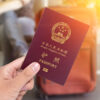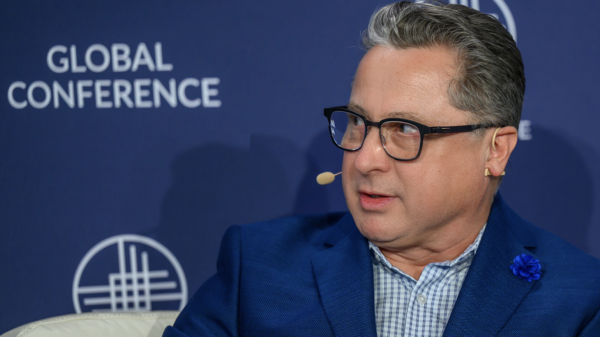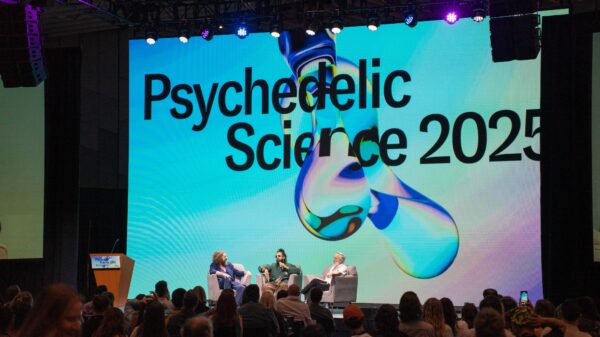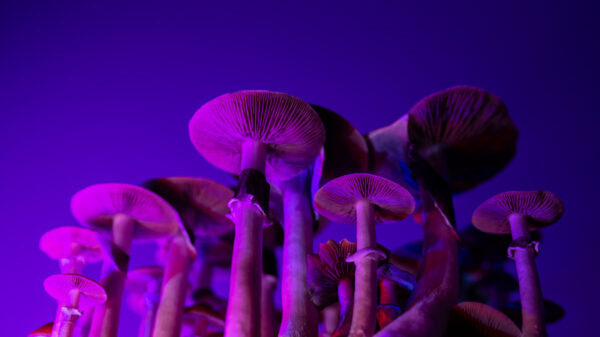Psilocybin interacts less with psychiatric medications compared to MDMA because of how it’s metabolized and where it acts on the cell, according to a new research review published in the journal Psychopharmacology.
But the study also shows that there’s still a big gap in psilocybin research compared to MDMA, and further investigation is needed.
Led by researchers at Oregon Health & Science University, the paper compiles studies looking at drug-drug interactions between the two popular drugs and the most common psychiatric medications used for mental illnesses like major depressive disorder, post-traumatic stress disorder and anxiety disorders.
“The current standard of care for these disorders involves treatment with psychiatric medications (e.g., selective serotonin reuptake inhibitors), so it will be important to understand drug-drug interactions between MDMA or psilocybin and psychiatric medications,” reads the study.

MDMA in its crystallized form. Photo by Bsteinmann via Wikimedia Commons
In 2017, the FDA gave breakthrough therapy designation to MDMA-assisted psychotherapy for post-traumatic stress disorder and in 2018, the agency gave the designation to psilocybin-assisted psychotherapy for both major depressive disorder and treatment-resistant depression.
The designation speeds up the development and review of drugs intended to treat serious or life-threatening conditions for which preliminary clinical evidence suggests substantial improvement over available medications.
Researchers in the study mention how PTSD, depression and anxiety disorders are commonly treated with adrenergic drugs, antipsychotics, anxiolytics, mood stabilizers, psychostimulants and antidepressants.
Read more: Positions of NIH, FDA signal we’re ‘on the brink of a psychedelic revolution’
Read more: FDA lifts ban on study of therapists taking MDMA
Because both MDMA and psilocybin affect the regulation of serotonin, there’s a potential for interactions with medications that also modulate serotonin levels.
For the study, researchers used the Medline database and looked at previously published human studies from 1958 to 2020. They analyzed 40 publications with 26 reporting outcomes from studies with “healthy” adults, as well as three epidemiologic studies and 11 case reports.
The majority of the studies involve drug interactions with MDMA. Researchers focused on the pharmacodynamic, physiological and subjective outcomes.
Taking antidepressants with psilocybin may carry fewer risks than with MDMA
When researchers looked at studies related to common antidepressants they found that MDMA interacts with some of the same parts of the cell as many psychiatric medications, which could lead to toxic levels of serotonin.
Because MDMA also alters the norepinephrine and dopamine neurotransmitter systems as well, there are potential interactions with drugs that target these neurotransmitters, such as bupropion, SNRIs and psychostimulants.
Combining MDMA and bupropion — a smoking cessation medication also used to treat major depression — was found to increase the risk of seizures.
In the only study examining the interaction of psilocybin and a common SSRI antidepressant escitalopram, it was found that the antidepressant didn’t inhibit the positive effects of psilocybin. It showed to reduce negative side effects like anxiety that sometimes happen during a psilocybin trip.
When serotonin is blocked pharmacologically by drugs like buspirone, chlorpromazine, ketanserin, or risperidone, there’s a consistent pattern of reduction of psilocybin’s subjective effects.
“Compared to MDMA, psilocybin is less likely to contribute to pharmacokinetic drug-drug interactions given that its metabolic pathway predominantly involves UGT1A10 and UGT1A9,” researchers explain.
Read more: Common antidepressant escitalopram and psilocybin can be taken together safely: study
Read more: Psilocybin therapy for major depression can relieve symptoms for a year: study
When researchers looked at the effect of MDMA and haloperidol, an antipsychotic used to treat psychosis, people reported a reduction in feelings of well-being and higher rates of anxiety.
“Haloperidol does not attenuate psilocybin’s effects, and, in fact, exacerbates anxiety and produces dysphoria,” the researchers explain.
Other antipsychotics like risperidone lowered the subjective effects of psilocybin, including a reduction in dread from ego dissolution.
In contrast to risperidone, haloperidol had no effects on psilocybin-induced perceptual changes, but did increase dread.
MDMA and MAOIs could lead to adverse, fatal side effects
The review showed the highest rates of deaths occurred from combining MDMA with monoamine oxidase inhibitors (MAOIs), such as moclobemide or phenelzine. Some cases involved abnormally high body temperature, seizure-like activity and altered mental state, a number of which were fatal.
MAOIs are a stronger class of antidepressants that treat depression by preventing the breakdown of serotonin, dopamine and norepinephrine. But when combined with MDMA, it can result in dangerous spikes in serotonin.
The study mentions how some antipsychotics and benzodiazepines, while commonly suggested and used to manage psychedelic crises, no research backs this up.
In fact, some studies have found that MDMA and benzos were associated with an increased ratio of death—higher than that of co-ingested opioids, alcohol or antidepressants.
In popular online drug knowledge communities like Erowid, users gather information and report experiences on psychedelics and other illicit substances. According to the review, some of those users have encouraged using olanzapine as a “trip terminator” for self-management of difficult psychedelic experiences.
But recent data show that olanzapine mixed with MDMA is associated with fatality, while other antipsychotics like risperidone showed no correlation with death.
“The absence of clinical trials on the combination of benzodiazepines or atypical antipsychotics with MDMA, and mixed data regarding heightened risk with psilocybin, suggest that it would be valuable to investigate these drug-drug interactions in future research.”
Follow Natalia Buendia Calvillo on Twitter
natalia@mugglehead.com













